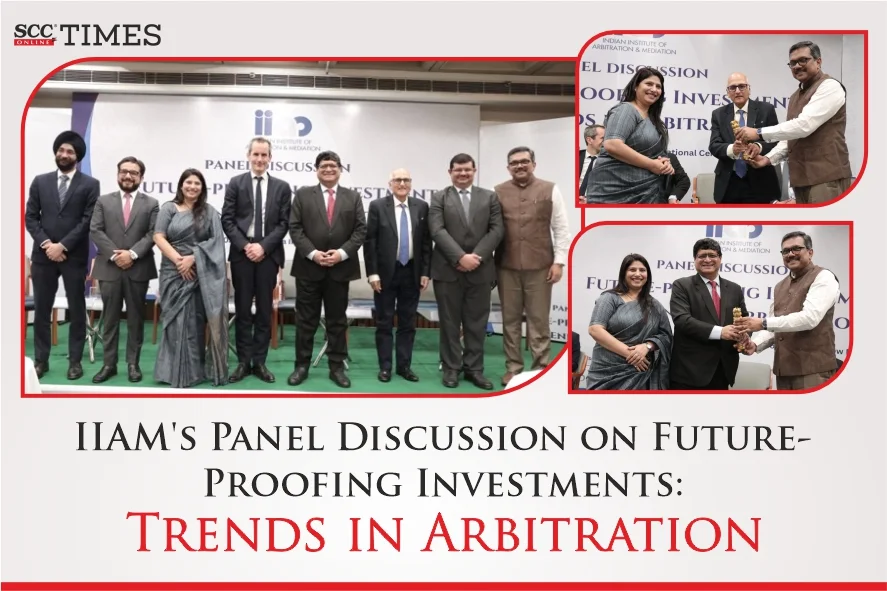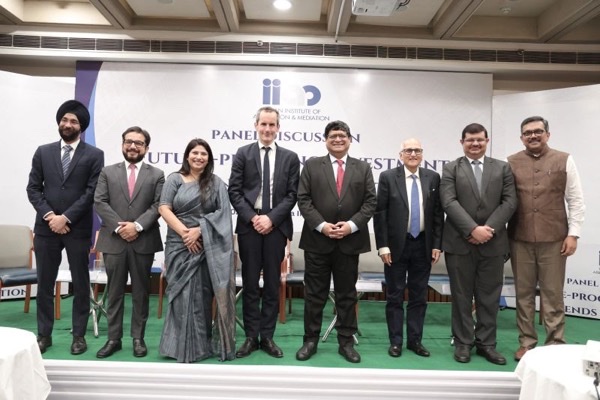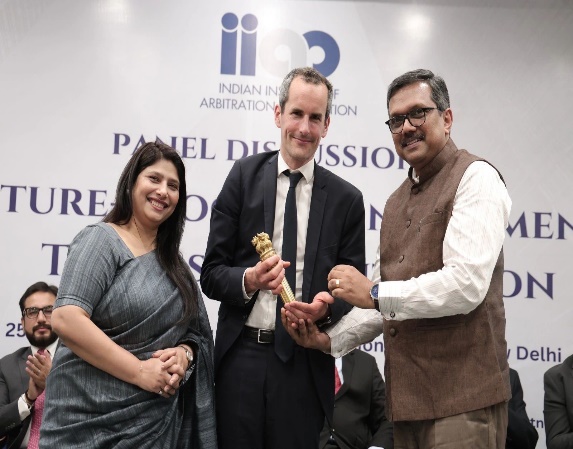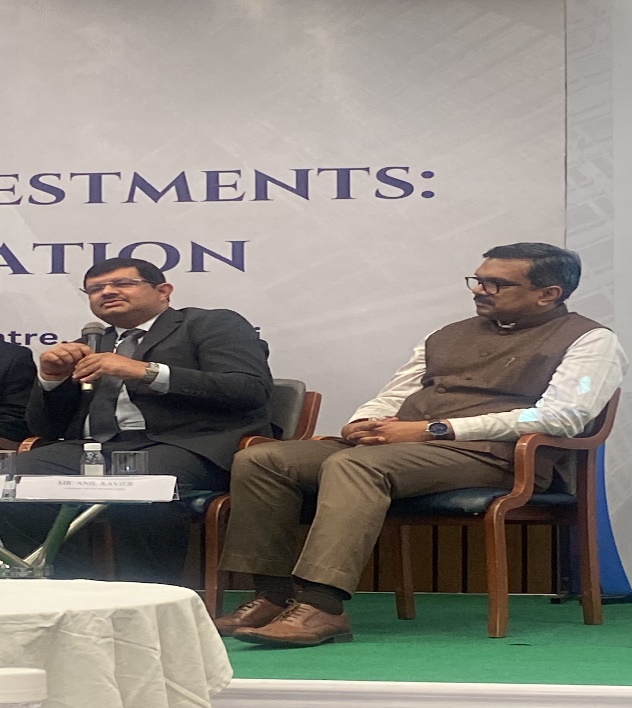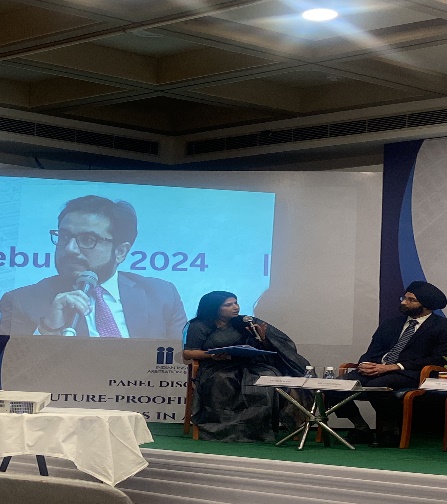The Indian Institute of Arbitration & Mediation (IIAM) organized a Panel Discussion on “Future-Proofing Investments: Trends in Arbitration” on 25-02-2024 at New Delhi.
The Panelists for the discussion were Justice Sudhanshu Dhulia, Judge, Supreme Court of India; Justice S.R. Bhat, Former Judge, Supreme Court of India; Mr. Friedrich Rosenfeld, Partner at Hanefeld; Mr. Anil Xavier, Chairman, Asia Pacific Centre for Arbitration & Mediation (APCAM), President, IIAM; Mr. Sidharth Sethi, Partner, JSA Advocates & Solicitors; Mr. Tejas Karia, Partner, Shardul Amarchand Mangaldas; Mr. Avnit Singh, Director, Ministry of Law and Justice.
The Moderator for the panel discussion was Ms. Iram Majid, Executive Director, APCAM, Director, IIAM.
Ms. Iram Majid welcomed all the panelists and guests to the panel discussion with an opening remark that “Investment arbitration is like referee in the game, making sure that everyone plays fair”.
Justice Sudhanshu Dhulia recalled the Panch Parmeshwar, a story by Munshi Premchand and says that the story is all about arbitration. He said that criticism of Judgments must be there, but it is the ambiguity in the Laws which gives rise to these Judgments which are to be ultimately questioned. On the question of future of Arbitration in India, he said that the country has a bright future in Arbitration, as we can see how many arbitration Centres have come up, Mediation Act has come up.
On the question about the Arbitration community adapting with the upcoming changes in Commercial Arbitration, Justice SR Bhat talked about the threshold difference in International and Domestic Awards. He also said that there is a sense that things are getting settled in Arbitration, but we often see different views taken by High Courts. He added that slowly it has been routed in the legal community that Institutional Arbitration is one way, which is a promising progress. Justice Bhat explained that there is a wide difference in Commercial Arbitration and Investment Arbitration. In Investment Treaty arbitration, there is no uniform law, and investors select the rules and laws to be applied.
Mr. Friedrich Rosenfeld focused on three keys for the Developmemt of Arbitration:
-
Ability to listen.
-
Finding new solutions for the problems faced.
-
Innovative environment for the adaptation of Arbitration.
Mr. Avnit Singh gave his insights on the changes in International Arbitration regime and how Indian Arbitration can learn these changes. He said that ‘time’ is the key in arbitration, being a time bound dispute resolution process. He stated that Arbitration should be appropriate dispute resolution rather than alternative dispute resolution. Regarding investment Treaty, he said that the intention of having the Investment Treaty was to bring in the money for the developing and underdeveloped countries and the aim was to thrive the investments, even at the cost of sovereigns letting go off their control over the laws.
On the question of dispute resolution through Arbitration, Mr. Tejas Karia said that Arbitration is a medium through which disputes can be resolved amicably. One advantage of arbitration is the informal process, say in choosing the Arbitrator, the parties are free to appoint their arbitrator. He also said that it must be ensured that institutional arbitration is opted for, it is the best way to resolve the dispute. On Investment Treaty Arbitration, Mr. Karia explained that one side is always the State. If the Investor belongs to the State, which has signed the treaty, the Investor deserves the protection. He also said that various rights are also given to the Investor pursuant to the signed treaty. Protection against arbitrariness, is also given to the Investor to protect his interest.
He further added that virtual hearings in Arbitration is a major factor which is promoting it more and more. He also talked about the building of the Arbitration Bar and the suggestions given for the same and further amendments to the Arbitration Act. He also highlighted the positive mind set up which the legal fraternity has towards Arbitration.
Mr. Anil Xavier agreed with Mr. Singh and said that as far as adapting to the International arbitration scenario is concerned, the stakeholders are involved. He stressed that Arbitrators should be updated with the latest changes and once the people know what Award is given, it will be easier to adapt with the International scenario. Mr. Xavier also talked about the environmental, social, and corporate governance (ESG) violation and the Arbitral Tribunal can refuse from giving an award if such a violation is found by any of the parties and even if the Award is given, the Court can refuse from upholding such an Arbitral Award. He remarked that ESG norms always help in promoting healthy investments.
On the aspect of funding of Arbitration Mr. Sidharth Sethi said that funding can help companies in developing and utilising their resources towards their growth rather than expensive litigation. He also talked about the trend of AI in Arbitration and how it can benefit the lawyers, students and Arbitrators, who must learn these technologies and adapt with them.
Further, he talked about the requirement of gender diversity in Arbitration Institutions. He also highlighted that there are investment Treaties which provide for eligibility criteri and that if the investor is not able to meet the eligibility criteria, they may not be able to bring in the dispute.


